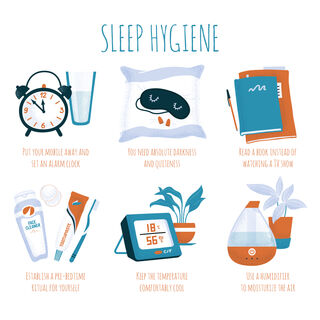Stress
Star Strategies to Simultaneously Enhance Sex & Lower Stress
Stress and unsatisfying sex have similar causes and straightforward solutions.
Posted January 18, 2021 Reviewed by Ekua Hagan
It is rare for a person to go through their entire life without some kind of sexual concern (e.g., ranging from concerns about "Am I normal?" to more serious problems such as painful sex). Similarly, it is part of the human condition to experience worry and stress, although (likely due to our biological makeup) some of us worry more than others. In short, both dissatisfying sex and high stress are very common. They also share similar causes and solutions.

In terms of the shared cause, the biggest is our brain. To explain, sex educators and therapists are fond of saying that "Your most important sex organ is between your ears" because if your head's not in the game, it doesn't matter what's happening between your legs. Good sex requires letting go of self-monitoring during sex (e.g., "Do I look OK?" Am I taking too long to orgasm?" "Am I doing this right?"). For good sex, it is also necessary to rid oneself of shameful thoughts during a sexual encounter (e.g., "This is weird that I like this"; "I shouldn't be doing this").
Instead of such negative thinking and self-monitoring, to enjoy sex one must embrace a present-focused, body-immersed state of mind. Similarly, our brain (i.e., the tone and focus of our thoughts) is also the biggest cause of worry and stress. As humans, we have the unique capacity to think about the past and the future, and this capacity is a double-edged sword. That is, this ability to think outside of the present moment helps us learn from our mistakes (e.g., thinking about the past) and problem-solve (e.g., thinking about the future). But, it also can take us out of the present moment and spin our anxiety out of control. There is a difference between active problem-solving (e.g., thinking ahead to "If I do this, I can solve that") and worry (e.g., thinking ahead to our worse fears with no problem solving entailed). In short, the way we think can cause both sexual problems and stress.
Given this, it's not surprising that both high stress and unsatisfying sex share some similar solutions! Stated more positively, experiencing great sex and serenity can both be facilitated by the same strategies. Just three of these star strategies are listed below.
Mindfulness: In my book, Becoming Cliterate, I call mindfulness "sex's best friend." This is because to experience orgasm, one must turn off one's thinking, the monitoring brain, and immerse in the moment fully, as well as be able to bring oneself back to the moment when one's mind invariably wanders. In fact, some recent research indicates that the mind-state one enters in deep mindfulness meditation is the same state one enters directly prior to orgasm. In short, orgasm requires turning your brain off and focusing in the present.
The same exact strategy works for stress. A mindfulness practice (e.g., daily mindfulness meditation) and the ability to be mindful during daily life is scientifically linked to lower stress. You also don't have to sit and meditate for hours to get the benefits! You can, for example, practice it during daily tasks (e.g., when brushing your teeth, fully immerse in the sensations and bring your mind back when it wanders).
Of course, a daily meditation practice can help, but again it doesn't need to take hours. As a personal example, I have an odd but effective mindfulness practice. Every morning, I pour myself a cup of coffee and take it to my "meditation corner" (a pillow to sit on in front of a table with candles). I light the candles, sit down, turn on my favorite six-minute music meditation on Insight Timer, and drink my coffee.
As I do, I immerse in seeing the candles flicker, hearing the music, feeling the warmth of the coffee cup on my hands, and the flavor of the coffee as it hits my taste buds. Even in these short six minutes, my mind wanders to tasks of the day or concerns from the day before. Yet, consistent with mindfulness, I notice this without judgment and then intentionally return to the present moment. In short, mindfulness is a scientifically-proven enemy of both worry and bad sex, and the best friend of serenity and great sex.
Exercise: Studies show that exercise decreases stress, both in the short term and the long term. This is partially due to the fact that if one immerses fully in the moment during exercise, it can be a form of moving meditation. The positive effects of exercise on stress are also in large part due to the feel-good hormones released during exercise, which seem to have both an immediate effect and a cumulative effect if one develops and sticks with an ongoing, consistent exercise program. These same hormones are responsible for exercise having a positive effect on sexual functioning.
Similarly, according to one article, "A vigorous workout affects hormones, neurotransmitters, and autonomic nervous system activity. It also raises and sustains levels of an enzyme in women that increases genital blood flow and arousal. Just 20 minutes of exercise could boost sexual arousal by 169 percent." These effects are short-lived, however, and so one great strategy for better sex is to exercise directly before getting frisky.

Also, one type of exercise, yoga, has been linked to more long-term benefits in sexual satisfaction, perhaps due to the mindfulness it can help cultivate. Again, moving your body is good for quieting your worry and for enhancing what you do with that body between the sheets.
A Good Night's Sleep: Speaking of between the sheets, a good night's sleep is essential for both decreasing stress and enhancing sex. Getting a good night’s sleep can increase desire. One study found that the longer women slept, the more interested in sex they were the next day. Just one extra hour of sleep led to a 14 percent increase in the chances of having a sexual encounter the following day.
Also, in this same study, more sleep was related to better genital arousal. Of relevance, one of the biggest reasons people aren't sleeping well is stress and worry, yet the irony is that lack of sleep makes us much less able to deal with stress. An article by the American Psychological Association explains this connection, pointing out that "When they do not get enough sleep, 21 percent of adults report feeling more stressed. Adults with higher reported stress levels (8, 9, 10 on a 10-point scale) fare even worse—45 percent feel even more stressed if they do not get enough sleep."

But, getting a good night's sleep is way more elusive for many people than even an exercise or meditation program. Still, there is a lot of help out there and it's worth pursuing. Put "sleep hygiene" into Google and you will find a ton of helpful tips and articles, such as this one.
These three tips—mindfulness, exercise, and good sleep—are almost guaranteed to enhance your general and sexual well-being.




